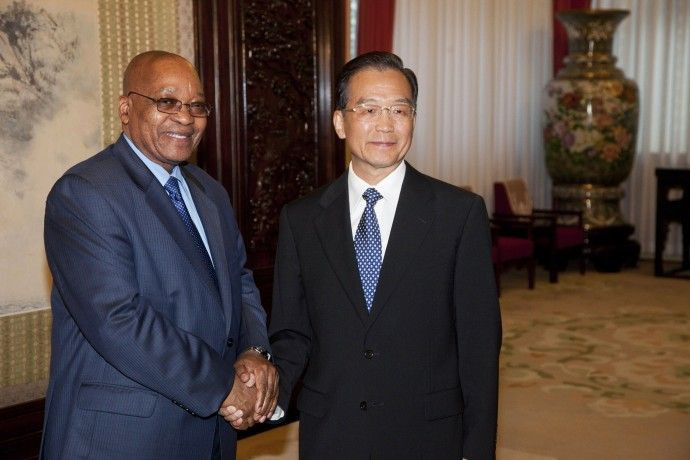What is behind China's move to include South Africa in BRIC grouping?

South Africa is about to join the Brazil, Russia, India and China (BRIC) grouping and will attend the first summit of the leading emerging economies in April this year, but doubts remain over the suitability of the African nation to be in the exclusive club of the fast-growing economies.
Is South Africa gate crashing into the original grouping thanks to Beijing's open policy of wooing business allies from Africa?
Goldman Sachs executive Jim O'Neill, who originally crafted the BRIC concept, is not exactly enthused by the Chinese move to invite South Africa to the grouping.
It is not entirely obvious to me why the BRIC should have agreed to ask South Africa to join. How can South Africa be regarded as a big economy? And, by the way, they happen to be struggling as well, he said.
South Africa's Cooperation Minister Maite Nkoana-Mashabane said the country has got a formal invitation from China, which holds the rotating presidency, to join the group. China, in its capacity as rotating chairperson of the Bric formation, based on agreement reached by the Bric member states, invited South Africa as a full member into what will in future be called Brics, Nkoana-Mashabane was quoted by Mail and Guardian last week.
The Chinese decision was conveyed to her by none other than Foreign Minister Yang Jiechi who personally telephoned her. She also said Chinese President Hu Jintao also sent an invitation to President Jacob Zuma to attend the third Brics leaders' summit to be held in China.
WHY SOUTH AFRICA?
South Africa’s economy is not par with any of the existing BRIC members; in fact, it's only about one-fourth the size of India's. South Afirca's GDP is far below some of the other major growth economies like South Korea, Mexico and Turkey. South Korea's GDP is put at $830 billion while Turkey's is $615 billion and Mexico's $875 billion.
South Africa has an economy of $286 billion, which is less than a quarter of that of Russia, the smallest of the BRIC nations. Its population is also dwarfed by India's 1.2 billion, Brazil's 191 million and Russia's 142 million, Moscow Times wrote.
South Africa's economy is very small, it quoted O'Neill as saying. For South Africa to be treated as part of BRIC doesn't make any sense to me. But South Africa as a representative of the African continent is a different story.
Lauding the Chinese decision to invite her country to the BRIC, Nkoana-Mashabane said the invite was the best Christmas present ever. She said the country had been lobbying hard for membership to the grouping, and that President Zuma has made state visits to all BRIC nations since he came to power.
We bring the most diversified and most advanced economy on the continent, Nkoana-Mashabane said, adding. We may not be the same size, but we can open up opportunities for them and through that, we can complete our economic integration on the continent.
Apart from that, is there anything else that helped South Africa's case for BRIC membership? Analysts feel that the best Christmas present ever could really have been given by Beijing with a view to strengthening its political clout in the region.
MORE POLITICS THAN BUSINESS?
China is South Africa's largest trading partner and Beijing obviously wanted to extend its hold over the African region as it pushes ahead with plans to mop up natural resources from untapped markets everywhere in the world, especially Africa and Latin America.
Beijing has taken a far-fetched investment decision to create political goodwill by inviting South Africa to the BRIC grouping, writes a former Indian career diplomat, M.K. Bhadrakumar, in Asia Times. “For one thing, China knew South Africa was interested to join BRIC and assessed that it pays in many ways to show Beijing is prepared to go the extra league to protect its number one African partner's interests.
He also notes that while Brazil and Russia have welcomed the inclusion of South Africa, India did not officially react to the development, though it was impossible that New Delhi would oppose South Africa's entry. He also says that China has outsmarted both India and the U.S. with the move.
Beijing's decision to bring South Africa, which is the heavyweight in Africa, into BRIC pre-empts the proposed US-Indian collaboration. Without doubt, both Washington and Delhi would estimate to their discomfort that the grouping's anchor of economic logic has been unmoored. Neither expected Beijing to move so fast, Bhadrakumar wrote.
© Copyright IBTimes 2024. All rights reserved.




















